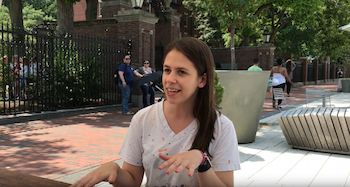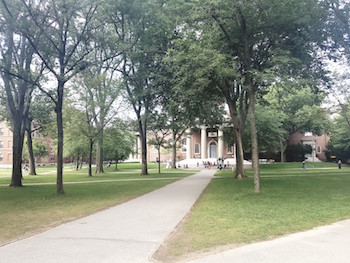Students’ ceaseless fights for equal rights

Radcliffe Union of Students: Harvard’s oldest feminist organization
Ewha was Korea’s first women’s education institution that began with a single student in 1886. It comes as quite a shock that even Harvard, the oldest school in the US founded in 1636, only began admitting women on an equal basis in 1975.
In 1879, Radcliffe College was founded “to furnish instruction and the opportunities of collegiate life to women and to promote their higher education.” Until 1943, Radcliffe’s female students were provided reruns of lectures professors had already given at Harvard. In 1946, most Harvard classes became co-ed, and in 1967, women were allowed in the Lamont Library for the first time. By 1999, the merging of Radcliffe with Harvard was complete.
Radcliffe Union of Students (RUS), which began as Radcliffe College’s governing body, remains today as Harvard’s oldest feminist organization.
“We decided to keep the name RUS even though all of our members are students at Harvard, and Harvard alone,” said Brittany Ellis, the copresident of RUS.
“We keep the name to remember the women who came before us: who had to clean the rooms of other (male) Harvard students, who were not allowed into Harvard’s Faculty Club.”
Today, RUS meets weekly to discuss feminist topics. Its 11-member board plans events including concerts by feminist performers, women’s health events, lectures, movie screenings and discussions, coffee hours and photo projects.
RUS, which began for women’s educational rights, now accommodates the entire spectrum of genders.
“The definition of feminism that RUS works with is the belief of equality in all genders,” said Emma City, a former RUS president majoring in History and Literature, now in her senior year at Harvard. “That tends to be very inclusive both in the sense that a lot of people assume that feminism is a belief that women are superior – that’s obviously not what we advocate for – and that we don’t necessarily view gender as a binary.”
City admits that even she struggled to approach issues from multiple perspectives, as demonstrated with the wording of one of the RUS’s most popular events: ‘The Orgasm Seminar.’ When male students complained that the seminar primarily dealt with female anatomy, RUS changed the title to ‘The Female Orgasm Seminar’ which in turn, drew complaints from transgender women who did not feel included in the title. The name was then switched to ‘The Female Body Orgasm Seminar’ but eventually returned to The Orgasm Seminar as the former was too lengthy.
“The talk itself has always been inclusive of people of all different genders but the title was something we ran into issues,” City said. “It didn’t even occur to us that by calling it the Female Orgasm Seminar we might be excluding people.”
The seminar was part of Harvard’s spring Sex Week event where student groups come together to educate fellow undergraduates on sex and sexuality.
“The idea behind the seminar is that typically in society, male orgasm is something expected but the female orgasm is seen as something that’s allegedly harder to achieve,” City explained.
As Harvard is considered a very liberal campus, those who do not share feminist values usually keep their views under the radar simply because they are so hugely outnumbered. This was why many were appalled to discover in October 2016, that the Harvard men’s soccer team had rated the individuals of the women’s team on a sex appeal scale from 1 to 10, explicitly describing their preferred sex positions, such as “doggy style” and “cowgirl.” The men’s team was banned from playing that season after the revelation.
“We have assumptions that because these people are so educated they must understand that everyone is equal.”
“It was definitely disturbing to a lot of the women on campus who assumed that all the men were seeing them equally as their fellow students. I do think that since then people have been more aware of their actions,” City added.
The air on Harvard campus also changed with the Trump Administration, which acted as a wake-up call on gender issues. Many students participated in the Women’s March in Washington DC and Boston last March 8, on International Women’s Day. There was a notable increase in RUS event attendance and applications to work on its board.
“For RUS, one of the best things that happened was Trump being elected,” City said with a playful smile. “People were surprised that so many of their rights they had held for so long could be in jeopardy. The people, I think, after the election wanted to feel that they were doing something more tangible – express their opinions and their feminist views because when we came back to school we were all a bit shaken.”
Yet, the word “feminism” is still often misunderstood both in Korea and the US. In Korea, men have posted online that some women who refused to give them their numbers replied, “I’m a member of Megalia.” This feminist website is known for spreading the trend of fighting back online misogyny by “mirroring” – a tactic that flips the word “women” to “men” in sexist slurs that used to be directed at women. This was strongly disliked by men who viewed it too radical. Korean women understand perfectly well that announcing themselves as feminists is perfect medicine for fending off unwanted interest from men.
“One of my roommates was horrified that I was a feminist because she thought that that meant I was, you know, against men and crazy and radical,” City said with a laugh. “She’s actually part of RUS. She ended up joining. She realized that feminism really shouldn’t be (considered) radical. It’s literally just the belief that people are equal.”
As society dawdles towards gender equality, the slow pace of progress depresses many feminists. Yet, City noted the importance of continuing the fight.
“It’s important to have these discussions on campus because that’s how you continue the gradual change and you certainly don’t want to stop that.”


